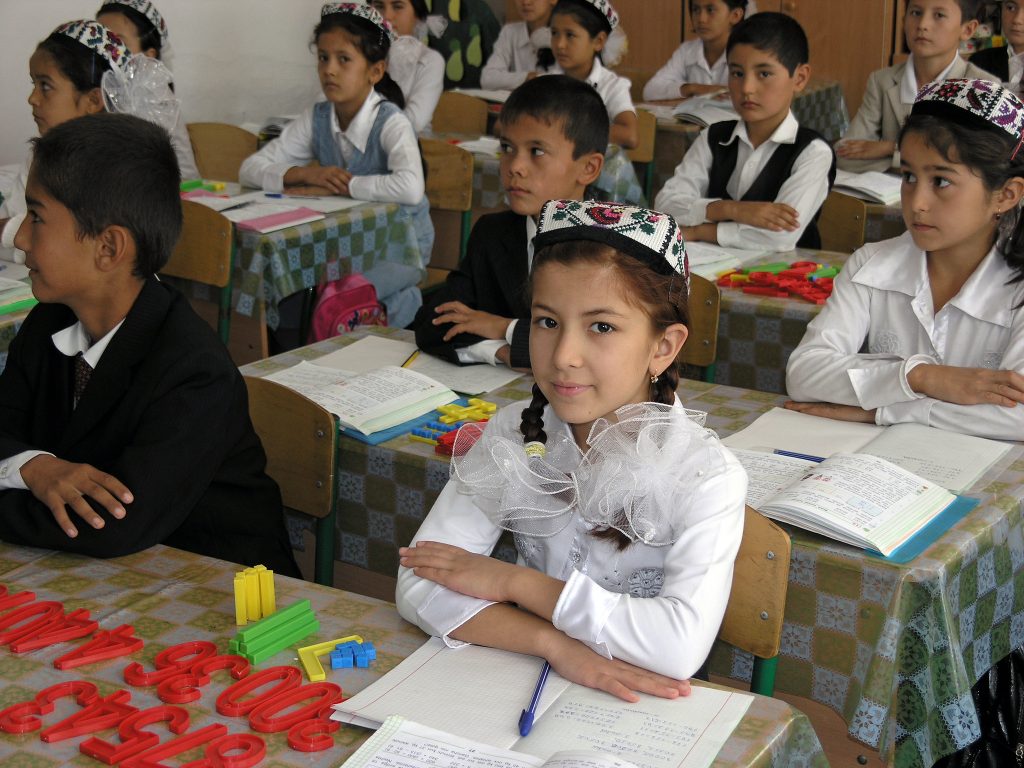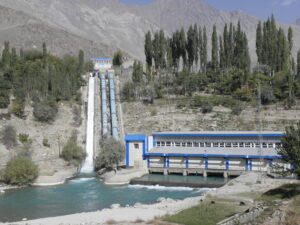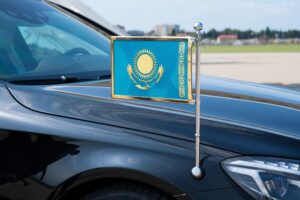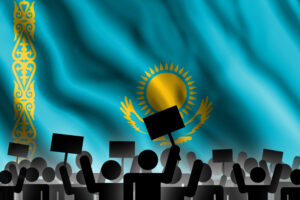Narrowing the digital divide in Uzbekistan’s education system: Covid-19 lessons

By Matluba Mukhamedova/ World Bank via Flickr under Creative Commons license.
Download “Narrowing the digital divide in Uzbekistan’s education system: Covid-19 lessons”
EUCAM-Commentary-41.pdf – Downloaded 2309 times – 164.64 KBThe Covid-19 pandemic transformed everyday realities overnight, as most services and activities had to be moved online. Education worldwide was hit hard. As schools and universities shifted to online learning, many schoolchildren and university students were left out. Long-term plans for digitisation had to be implemented within days; a challenge that many developing countries are struggling to cope with.
In Central Asia, shifting from in-person to online learning has been difficult. Many people do not have access to steady electricity, affordable high-speed and uncensored Internet, or reliable devices. Furthermore, the pandemic has also brought to the fore the urgent need to develop the necessary digital skills among various groups, from schoolchildren to teachers, and from policy-makers to civil society. Central Asian republics have taken divergent responses to the pandemic. Kazakhstan, Kyrgyzstan, and Uzbekistan introduced lockdowns in March 2020; in Tajikistan, quarantine measures were only partially implemented; while Turkmenistan still claims to have zero Covid-19 cases. Despite the different responses and approaches to Internet governance and its availability, all Central Asian countries share some common challenges in shifting to online learning. The case of Uzbekistan could apply to the greater region.
Uzbekistan closed all educational institutions in response to the pandemic. While some steps were taken to ensure continuous education, these were not easily accessible to all. Lessons for schoolchildren were broadcasted on mainstream television and were shared on the Ministry of Education’s YouTube channel, to which only a few have access. Lessons for university students moved online, but students and teachers alike suffer from a lack of adequate platforms for online education, a lack of access to technology, and a lack of necessary skills. Given that remote education is likely to continue in the coming academic year for most students, it is imperative that Uzbekistan urgently take several steps in the digital domain. Narrowing the digital divide is of strategic importance. Here are three priorities for policy-makers and other stakeholders to consider:
First, quality access to Internet is insufficient. Internet penetration levels in Uzbekistan have improved in comparison to previous years. According to official data from the Ministry for Development of Information Technologies and Communication of Uzbekistan, as of January 2020, 22 million people, out of a population of 34 million, had access to the Internet. Of these, 19 million were connected via mobile phones and 3 million via computers. However, when operationalising numbers in terms of Internet penetration and access, it is important to consider the type of connection, its speed, and its cost. Having a few megabytes on the phone can be considered as having Internet access for statistical purposes, but it is certainly not enough for remote work or learning. Internet accessibility in remote areas is still low, which largely contributes to the digital divide and inequality among the capital, regional centres, and the periphery.
When addressing the issue of access to the Internet, its speed, and its costs, we also need to consider the steady supply of electricity and access to modern technological devices. Without these basic conditions, it is impossible to deliver or receive online education. Online work or learning implies that several members of any given household need access to devices. The lack of physical access is experienced not only by students but also by educators. Therefore, approaches to solving this first level of the digital divide must be multi-faceted. Supplying schools with technology is one solution, but it is also necessary to ensure that students and educators have continuous and unrestricted access to technology at home. In Kazakhstan, the Connect-Ed initiative, launched by civil society activists, supplies schoolchildren in need with used or new devices donated by organisations and individuals. Such initiatives should be supported by state-level strategies to ensure that those providing and receiving online education have access to the necessary tools.
Second, digital literacy is another fundamentally important area when talking about narrowing the digital divide in Uzbekistan. Technology is entering all spheres, but the necessary training is not always available. People are now expected to navigate through the labyrinth of new media and digital tools, but without proper training, this could be a risky practice. In Uzbekistan, a common scene is customers handing bank cards to merchants and loudly announcing their PIN codes in front of the wider public. Trying to insert your code independently and in privacy could give the merchant (and those around her/him) the feeling that (s)he cannot be trusted. Whereas certainly there are positive aspects to this level of social trust, such practices may lead to the prevalence of crime and other hazardous outcomes as the country becomes more digital. The bank card example goes beyond individual behaviour and translates into systemic problems, with negligence in the process of instrumentalising new tools.
Digital literacy courses must become an integral part of the education process. Akin to the physical access issue, successful online education practices imply training sessions for students and teachers alike. Courses on specific functional aspects of new education tools must go hand-in-hand with courses on privacy, digital ethics, and online security. Such courses are beneficial for all segments of society, from schoolchildren to decision-makers. Awareness-raising campaigns to promote digital literacy and security could also be helpful in filling the gaps. The Ministry of Education, IT specialists, educators, civil society activists, and international donors should all collaborate to develop digital literacy curricula and campaigns. A concerted effort is important to avoid digital literacy education turning into a censorship-justifying mechanism.
Third, online freedom and transparency are problematic in Uzbekistan; digital security should not be synonymous with digital autocracy. The tragic irony of offering school lessons via YouTube in Uzbekistan lies in the fact that the platform (along with Facebook, Skype, WhatsApp, and Viber) is often inaccessible. The educational videos posted on the Ministry of Education’s YouTube channel show a few thousand views at best, which is very low compared to the country’s 6.1 million schoolchildren. Combating hate speech and other unacceptable behaviours online is important but a ‘one size fits all’ solution should be avoided. The progress achieved so far in terms of unblocking some websites and platforms must be maintained, and freedom of information guaranteed so that people may have access to a diversity of opinions and perspectives. Unfortunately, however, there is a tendency to emulate Russian- (and other neighbours) style digital governance, often characterised by pressure on platforms to collaborate with state security forces, ubiquitous surveillance, or persecution of social media users.
Corruption slows progress in Uzbekistan’s education system. If done right, shifting to digital tools could promote transparency in the education system. However, such a shift could also be counterproductive and strengthen corruption schemes during entry, mid-term and graduate exams. To avoid malpractice and increase transparency, international involvement, and broad national input are warranted. International partners, such as the European Union, could help Uzbekistan’s government develop the necessary legal frameworks and technological tools to ensure democratic, transparent, and accountable approaches to the digital domain. In this pursuit, it is essential that the local voices of civil society activists, bloggers, watchdogs, and other important actors be included in the discussion.
Urgent steps to secure access to online education need to be taken. The challenges of access, digital literacy, and online freedom are inter-related and inter-dependent and require a comprehensive response. While bringing about unprecedented threats to education, the pandemic could be an opportunity for Uzbekistan to re-evaluate, learn, and reform its approaches to the education sector.
Download “Narrowing the digital divide in Uzbekistan’s education system: Covid-19 lessons”
EUCAM-Commentary-41.pdf – Downloaded 2309 times – 164.64 KB






